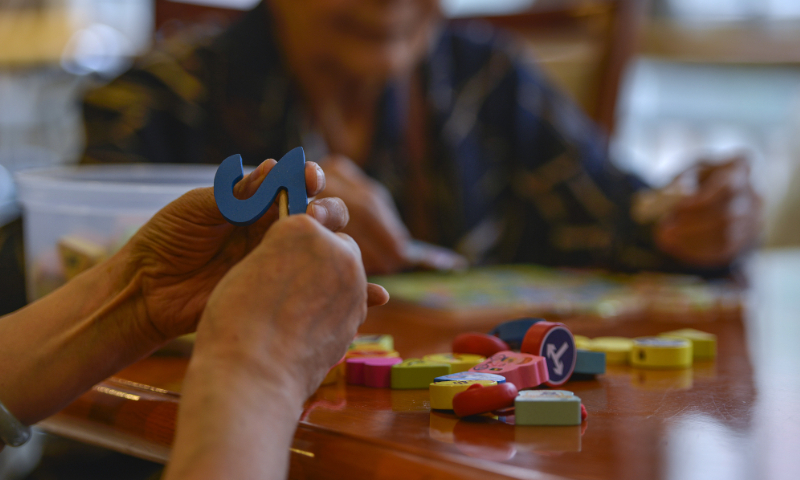Beijing-based hospital reports world's first case of a 19-year-old adolescent with Alzheimer's disease

An elderly patient is playing with intellectual toys on June 17, 2015 in a nursing home for patients with Alzheimer's disease in Chaoyang district, Beijing. Photo: VCG
A Beijing-based expert team has reported the world's first case of a 19-year-old adolescent with Alzheimer's disease (AD), a condition normally associated with elderly people.
The team, led by Jia Jianping from the Innovation Center for Neurological Disorders, Xuanwu hospital affiliated with Capital Medical University, released the research results in a peer-reviewed medical journal called Journal of Alzheimer's Disease.
The study confirmed that AD is no longer a disease exclusive to the elderly. Jia called for more attention to the possibility of AD occurring in younger people, which will become a challenging issue in the future.
The patient developed memory disorders at 17 years old and was then diagnosed with AD at 19. The patient first began to have difficulty concentrating on learning. One year later, the patient suffered significant short-term memory loss, an inability to recall the previous day's events or where personal belongings were stored, as well as difficulty reading and slow reactions, according to Jia's team.
Later the patient continued to suffer gradual memory decline, even struggling to remember having eaten. As a result, the patient had to drop out of high school. The gender of the patient is unknown.
Jia's team said that the patient has no family history of AD and no other causes of memory impairment such as genetic issues, infections or other diseases.
Since the first case of AD was reported in 1906, it has been widely believed that AD mainly occurs in the elderly. AD is a chronic neurodegenerative disease with slow onset and gradual loss of cognition, memory and speech and an increase in mental disorders over time, eventually leading to inability to take care of oneself. It is currently difficult to treat the disease.
There are two types of AD, familial and sporadic, Peng Dantao, chief physician of the Neurology Department of the China-Japan Friendship Hospital told the Global Times.
About 15 percent of AD patients have the familial type and the age of onset is generally when people are in their 50s. Very few develop symptoms in their 20 or 30s. Most AD cases are sporadic, and it is most common in people over 65. It affects about a fifth of those over 80, Peng said.
More than 50 million elderly people in China have cognitive impairment, including more than 15 million with AD, according to Jia's team.
Global Times


